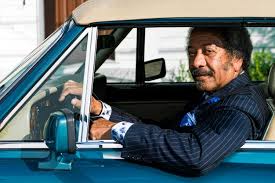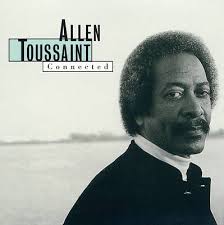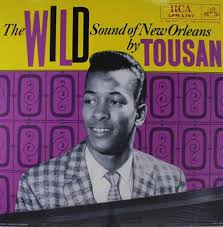“If I was to say my joy, piano is first.”
I loved Allen Toussaint before I knew who Allen Toussaint was.
Original Interview Audio:
My first exposure to Toussaint most likely came in 1960, when Ernie K-Doe ruled the Top Ten with “Mother-In-Law,” which Toussaint wrote, produced and played piano on. Next, possibly, was listening obsessively to the Yardbirds’ first album, which included a cover of Toussaint’s “A Certain Girl.” Or maybe it was the Rolling Stones cover of Toussaint’s “Cry to Me.” Then there was Lee Dorsey’s “Working in a Coal Mine,” which aside from Toussaint’s songwriting, production and piano, displayed his sublime talent as a harmony singer, his most underappreciated skill. And then there was my favorite cut on the Paul Butterfield Blues Band’s second album, Toussaint’s “Get Out of My Life Woman.”
I had no idea the same person had a role in all these songs. I had no idea they had any connection to New Orleans. And I never suspected that the pseudonymous female author of two of the above songs, Naomi Neville, was actually Allen Toussaint.
When Toussaint died in Madrid last month on November 10 at age 77, he was still far from a household name. When I talked to him in 1996, my specific goal was to bring some attention to the releases on his new record label, NYNO (for New York-New Orleans) – including his first solo full-fledged solo album in 17 years, “Connected” – and to get the word out about his forthcoming live appearances in New England, a rarity at the time.
Speaking to Toussaint, he was just as I imagined: intelligent, elegant, precise and polite –truly New Orleans’ answer to another regal, multi-faceted musical genius, Duke Ellington.
By phone from his office in Sea-Saint Studios in New Orleans
July 11, 1996
Was it your business partner Joshua Feigenbaum’s idea to start the new NYNO label?
It certainly was. We talked about it for the last three or four years, talked about what its purpose would be. Because he really loves music. He’s a very enthusiastic listener and he’s especially fond of New Orleans music. He said, “Let’s do the indigenous music of New Orleans,” and I thought it was a grand idea. Then we talked about how to present it in the best light we could.
New Orleans musicians seem to have struggled for many years to get their talent appreciated beyond the city.
I have some thoughts about it. If not frustration, I have had my concerns. But I also have understood and seen – it was quite obvious to me many times – that what’s most suffered is artist development: to develop careers as opposed to just being creative and putting out recordings. Yes, I’ve always been concerned about that, and I’m very glad to report that that is being looked at more seriously this day. There are quite a few artists who have gotten their heads on in a really good way and are doing it right. The Dirty Dozen, The Nevilles, Harry Connick, Dr. John, the Marsalises, they’re doing it right.
Was putting out your own album [“Connected”] part of the initial NYNO plan?
When we talked about doing a label early on, Josh thought of course we should have an Allen Toussaint on there, if a Toussaint there be. That made good sense to me also. But definitely the label is about the indigenous music of New Orleans in general, not just about me. But I’m very glad to be on it.
It’s been 17 years since your last album. Have you slowed down in the interim? [Further research revealed that Toussaint did put out a solo album of sorts between 1978’s “Motion” on Warner Bros. and “Connected”: “Mr. Mardi Gras: I Love A Carnival Ball” from 1987 on the 504 label is a synthesizer and drum machine-heavy eight-track, 29-minute minute set produced by Toussaint and his son Reggie.]
Oh, I had slowed down tremendously, but doing things all the time. Not as many mainstream artists as during the heydays, because we had these peaks and valleys. I was constantly doing things like jingles for commercials, benefits for local charities, doing things like that. And writing. I write because I simply write.
Your new album seems to be a mix of songs written over a long period of time.
I covered a couple of older songs I’d written for people. Like I did “Get Out of My Life Woman,” which I wrote for Lee Dorsey, I did it as an instrumental. And then I wrote for Lee Smith, “Rolling with the Punches” [an obscurity released as “I’ll Be Rolling (With the Punches)” by William D. Smith]. And even a third one called “Wrong Number,” which I wrote for Aaron Neville many years ago. But aside from those, the others are all new stuff written for the album. It was deliberate that I wanted this to be a piano and vocal album, not a vocal album with piano. I really wanted to play the piano a lot on this one, more than I did on some of my others.
“Get Out of My Life Woman,” live
William D. Smith, “I’ll Be Rolling (with the Punches)”
Did the album happen because you started getting the urge to record yourself again?
Not really. It was encouraged on by my son. I moved on it especially because of him. Then, when NYNO came around, Josh Feigenbaum pushed me to complete it.
How old is your son?
He’s 34 now. He’s moving along.
Do you consider yourself a reluctant performer?
I guess you could say that. My life has been geared around going into the studio with others. Performing is way down the totem pole even though it’s fun and it’s the meat of what we do. When you get up before a live audience, everything you do is geared toward that. There’s something extremely special about the reality of performing for a live audience.
You played the first Newport Rhythm & Blues festival last year [1995]. Did you put together a band especially for that performance? [The Rockport Rhythm &Blues Festival-Newport, conceived as a fund-raiser for the Rhythm & Blues Foundation, ended after 1996 when Rockport, dropped its sponsorship.]
We did that for that performance. The people I used were people in my band, but I just perform sparingly. So it wasn’t as if we were on tour and that was just another stop. We got together and went through rehearsals and all for that particular performance.
Did it encourage you to start playing live more?
This year, also NYNO has the new releases, so we’re doing a mini-tour. So that is the reason. The festival is an isolated performance that just happened to be there at the same time, so I’m glad to back for its second year.
How many pieces will you bring?
Five rhythm, three horns, maybe four, and two backup singers.
Last year your were joined by Steve Cropper. And you backed Sam Moore. Was that a thrill for you?
Oh yeah. It was wonderful to have Steve up there. He plays impeccable guitar. And when you hear him, you hear that thing that’s so identifiable in American music. To be right there hearing it. And people who were convicted [sic] to do what they do for so long, like Clarence Carter, that was just really great. And of course Sam is just directly to church. It was just wonderful. And of course Bonnie Raitt was another highlight. Good heavens, we were in high cotton.
Do you know who you’ll back this year?
I know Michael McDonald for one, which I’m really looking forward to. This guy is so hip. We talked yesterday on the phone about what we’re going to do together. And Chuck Berry, which I’m looking forward to. And there are other names thrown around, But I can’t be definite. The Dixie Cups will be there, I’d certainly like to play behind them.
Do you get to prepare at Newport or do you have to wing it?
I’d rather not wing it because the audience there deserves the best we can do. We’ll be going over the songs, like McDonald’s, without him. We’ll get ’em down in New Orleans and then we’ll rehearse with him when we get there. Whether they’re complex or simple, I want my band to know what they’re going to do. My life has been about producing artists. So when we play behind artists, as far as I’m concerned it’s a production. I like to do the best I can, even if it’s a shuffle in B flat.
Tell me about some of the other artists on NYNO. Like Amadee Castenell, he’s a horn player in your band as well as NYNO solo act.
Oh yes, he’s still one of the horns. Maybe with enough success for the record he’ll outgrow us, but for the moment, he’s a sax player.
Will Wallace Johnson [a veteran New Orleans soul singer whose sole album is NYNO’s “Whoever’s Thrilling You”] play with you on other gigs?
Definitely, he’s on tour. The tour’s to promote the three records we have out.
You are a producer, writer, pianist and singer. As far as what you enjoy most, what’s number one?
If I was to say my joy, piano is first. The things that I feel I do, if I could only do one, I’d say piano all the time. I like writing songs. I like the production process also of getting musicians in the studio. Last would be performing. Buts it’s such a thrill and it’s the real meat of the matter. That’s what it’s all about. What I do in the studio, even if it’s not me but another artist, it’s about designing it all so a performance can take place.
When it comes to piano, would you say Professor Longhair and Fats Domino were your greatest influences?
First and foremost, as far as the market and what we do and making music and records and all, Professor Longhair is number one. As far as me being excited and innovative and stuff that was off the beaten path, definitely Fats Domino stacking such a gold mine, the motherlode, so early on. And being so obvious. You could listen and hear the formulas and how well they work, just how much they meant. The simplicity of it all was perfection. Fats was also a very strong influence, not as much as a pianist, but for how well those things were done, how well it was put together. And Dave Bartholomew of course. He has to get equal billing there, because Dave was the producer, the trailblazer for us all.
Above: Toussaint demonstrates what he learned from Fess (Prof. Longhair)
Did Dave give you your break by getting you on sessions when you were first starting out?
Not really. But when he called me in, I did a doubletake. Things became more serious, because Dave was such a giant. I began going over to Dave’s office as a teenager and being around to play for whoever might come to audition. So I had a chance to be around him a little in hopes that some of his expertise would rub off on me. And I hope some did. Dave was very focused.
I see he plays trumpet on your new album. Is he still getting out there, still active?
Well, he’s active – as active as he wants to be. He makes a few performances and he’s in demand. He just operates at his own comfortable pace. So you don’t hear him very much these days. In a way he did make a special provision to play on my record.
I’ve read that you used to fill in for Fats in the studio when he was on the road. Does that mean you actually played piano on some Fats Domino records?
Yes, but not enough of them to make a difference. I played on three records. All the rest is Fats and no one does it better. Dave knew that I played like other people, especially Fats, because he was right there. So he called me in to play on three records of Fats – on records by other people also. Of course Fats being bigger than Davy Crockett at the time, that was the most notable. But when he did call me in, people did take me much more seriously. I played on “I Want You to Know,” [and] something about a school boy’s trip home, something like that. But aside from those three, all of Fats records have him. It was an honor, oh god yes.
One of your new songs is “Computer Lady.” Are you a net surfer?
I was into computers myself, but not online. It was actually inspired by a news piece I saw on TV about someone doing something illegal online. I thought, good heavens, someone with a strong imagination could do a lot of deceptive things with a computer. That’s what led me to do what I considered a positive image. That inspired that song. I was thinking if you’re online, you can be anything you want to be. Up to a degree. The truth will always come out in the end.
So do you know what plans there are for other NYNO releases?
We’re in the studio now with a new artist named Larry Hamilton. Total New Orleans r&b. Also we have James Andrews and the New Birth Brass Band. We have Raymond Myles, who’s a dynamite gospel act and he’s going to do secular music as well as as a choir director. And Grace Darling, she’s a saxophonist, blonde and beautiful and extremely talented. She’s a saxophonist who sings. We have very high hopes for her.
Will you produce them all?
Yes, but producer may mean less activity in the future. So I hope in a little while I won’t have to do everything. But Josh and I will always exercise quality control. We want to keep things as honest as they can be. We want to live up to our goal of delivering the indigenous music of New Orleans in the best light possible.
Do you want to do another album of your own before another 17 years go by?
Oh yes. I will get back to me. But we want everyone else on the roster to get an album out first.
[Postscript: NYNO released 14 albums between 1996 and its demise in 1999; perhaps the most notable was the Toussaint-produced live recording “A Taste of Heaven,” by gospel powerhouse Raymond Myles, who was gunned down at age 41 shortly before its release.]


